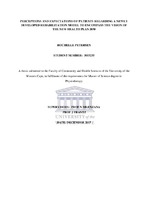Perceptions and expectations of patients regarding a new rehabilitation model to encompass the vision of the new health plan 2030
Abstract
People with disabilities face many challenges. Some are made to feel inferior
by others because of their physical or mental disabilities. Primary healthcare described by the
Alma Ata Declaration as "health for all", is a process of care which encompasses a
comprehensive approach to meet the basic healthcare needs of all, including people with
disabilities. The main focus of the primary healthcare approach is to put people at the centre
of healthcare. Primary healthcare utilises rehabilitation as a service. Rehabilitation services
worldwide are set to improve the standard that the United Nations Convention of the Rights
of People with Disabilities and National Committee of Rights People with Disabilities aims
to achieve. There are however, gaps in the delivery of healthcare services at a primary level,
as identified by the Western Cape Department of Health in South Africa.
The 2030 healthcare plan was developed to fill the gaps at this level of service. The plan
builds on the comprehensive service plan of healthcare 2010 which aimed to strengthen
community-based services, primary healthcare and district hospitals. The plan also looks at
how the Department of Health will operate using this platform. The framework was
established to focus on changes inclusive of threats in the environment such as technological
advances and the availability of resources, building on lessons learned in the Comprehensive
Service Plan 2010 as well as a reimagined future to improve healthcare services for all. Key
stakeholders in the Western Cape aim to improve these health services by providing patientcentred
care, moving towards a goal orientated outcome, improving services at a district
health level, improvement of equity, affordable health services and establishing premeditated
partnerships.

